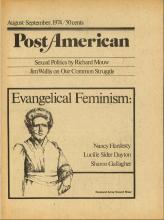GENERAL WORKS
Adams, Elsie and Mary Louise Briscoe. Up Against the Wall, Mother. Beverly Hills, Calif.: Glencoe Press, 1971. A good anthology of works, old and new.
Beauvoir, Simone de. The Second Sex. Translated and edited by H.M. Parshley. New York: Bantam Books, 1952. A classic study of “the woman problem.”
Bernard, Jessie. The Future of Marriage. New York: World Publishing, 1972. Studies “his” and “her” marriages and concludes that marriage makes women sick. Very encouraging to single women. A scientific study by a sociologist of long standing.
Bird, Caroline. Born Female: The High Cost of Keeping Women Down. New York: David McKay, 1968. Entertaining and hard-hitting presentation of women’s perils in the marketplace.
Davis, Elizabeth Gould. The First Sex. Baltimore: Penguin Books, Inc., 1971. “Proves that woman’s contribution to civilization has been greater than man’s,” to quote cover. Scholarship speculative at points, putting it charitably, but fascinating and mind-blowing.
Epstein, Cynthia F. Woman’s Place: Options and Limits in Professional Careers. Berkeley: University of California Press, 1970. Self-explanatory.
Friedan, Betty. The Feminine Mystique. New York: Dell Publishing Co., Inc., 1963. The one that started the movement this time around. Explains why the housewives were climbing the walls, and still are.
Kraditor, Ailene S., ed. Up from the Pedestal. Chicago: University of Chicago Quadrangle Books, 1968. Selections from the history of American feminism. For analysis see her Ideas of the Woman Suffrage Movement, 1890 to 1920. New York: Columbia University Press, 1965.
Read the Full Article

